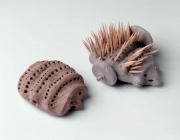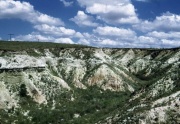Difference between revisions of "Marl"
Jump to navigation
Jump to search
m (Text replace - "== Authority ==" to "== Sources Checked for Data in Record ==") |
m (Text replace - "\[http:\/\/cameo\.mfa\.org\/materials\/fullrecord\.asp\?name=([^\s]+)\s(.*)\]" to "$2") |
||
| Line 2: | Line 2: | ||
== Description == | == Description == | ||
| − | A friable mixture of [ | + | A friable mixture of [[clay|clay]] that contains a high proportion of [[calcium%20carbonate|calcium carbonate]]. Marls are secondary clays that often contain [[sand|sand]], [[ferric%20oxide|iron oxide]], and other impurities. Marls are most often used as alkaline additives to soil. As a pottery clay, marl tends to be [[aplastic%20clay|aplastic]] and is often used for [[slip%20glaze|slipware]], [[earthenware|earthenware]], and [[brick|brick]]. Some examples of marls used in pottery are (Fournier 1996): |
| − | - Keuper marl: contains [ | + | - Keuper marl: contains [[magnesium%20carbonate|magnesium carbonate]] and [[gypsum|gypsum]]; variable in color |
| − | - Etruria marl: contains almost no [ | + | - Etruria marl: contains almost no [[lime|lime]] |
- Cambridge marl: contains about 40% lime | - Cambridge marl: contains about 40% lime | ||
Revision as of 12:16, 9 May 2016
Description
A friable mixture of Clay that contains a high proportion of Calcium carbonate. Marls are secondary clays that often contain Sand, iron oxide, and other impurities. Marls are most often used as alkaline additives to soil. As a pottery clay, marl tends to be aplastic and is often used for slipware, Earthenware, and Brick. Some examples of marls used in pottery are (Fournier 1996):
- Keuper marl: contains Magnesium carbonate and Gypsum; variable in color
- Etruria marl: contains almost no Lime
- Cambridge marl: contains about 40% lime
Synonyms and Related Terms
Keuper marl; Etruria marl; Cambridge marl; calcareous clay; marga (Port.)
Additional Information
R. Fournier, Illustrated Dictionary of Practical Pottery, Chilton Book Co., Radnor, PA, 1996.
Sources Checked for Data in Record
- G.S.Brady, Materials Handbook, McGraw-Hill Book Co., New York, 1971 Comment: p. 118
- Henry Hodges, Artifacts: An Introduction to Early Materials and Technology, Ronald P. Frye, Kingston, Canada, 1988
- Robert Fournier, Illustrated Dictionary of Practical Pottery, Chilton Book Company, Radnor, PA, 1992
- Random House, Webster's Encyclopedic Unabridged Dictionary of the English Language, Grammercy Book, New York, 1997
- The American Heritage Dictionary or Encarta, via Microsoft Bookshelf 98, Microsoft Corp., 1998
- Art and Architecture Thesaurus Online, http://www.getty.edu/research/tools/vocabulary/aat/, J. Paul Getty Trust, Los Angeles, 2000

